Mikhail Gorbachev dies; Soviet Union's last leader helped end Cold War
- Oops!Something went wrong.Please try again later.
- Oops!Something went wrong.Please try again later.
- Oops!Something went wrong.Please try again later.
For six long years, Mikhail S. Gorbachev assiduously turned his attention to one Herculean chore — dismantling the machinery of repression that his predecessors had so proudly and methodically erected.
In a breathtaking series of reforms as Soviet leader, he lifted the Iron Curtain that drew a messy line between the East and the West, liberated the arts and pulled Red Army troops from foreign conflicts such as the Soviet Union’s 10-year debacle in Afghanistan.
He forged disarmament treaties with Cold War enemies, freed political prisoners and ushered in the unfamiliar notion of free elections, cracking open the door for states in Eastern Europe to eventually break free of Moscow’s rule.
“The winds of the Cold War are being replaced by the winds of hope,” Gorbachev said in 1988 of the changes then sweeping away the old ways of confrontation.
Although many of Gorbachev’s reforms were short-lived, they made "perestroika" and "glasnost" household words around the globe in the 1980s and removed the shackles from a society deeply scarred by dictatorships that for decades had restricted thought, word and deed.
One of the most influential politicians of the 20th century and the last leader of the Soviet Union, Gorbachev died Tuesday at 91. He had been suffering from acute diabetes and was undergoing treatment at a hospital in Moscow, according to Russian news agencies.
Kremlin spokesman Dmitry Peskov said in a statement that Russian President Vladimir Putin offered his deep condolences over Gorbachev’s death and would send an official telegram to Gorbachev’s family.
“Mikhail Gorbachev was a man of remarkable vision,” President Biden said. “When he came to power, the Cold War had gone on for nearly 40 years and communism for even longer, with devastating consequences. Few high-level Soviet officials had the courage to admit that things needed to change. As a member of the Senate Foreign Relations Committee, I saw him do that and more.”
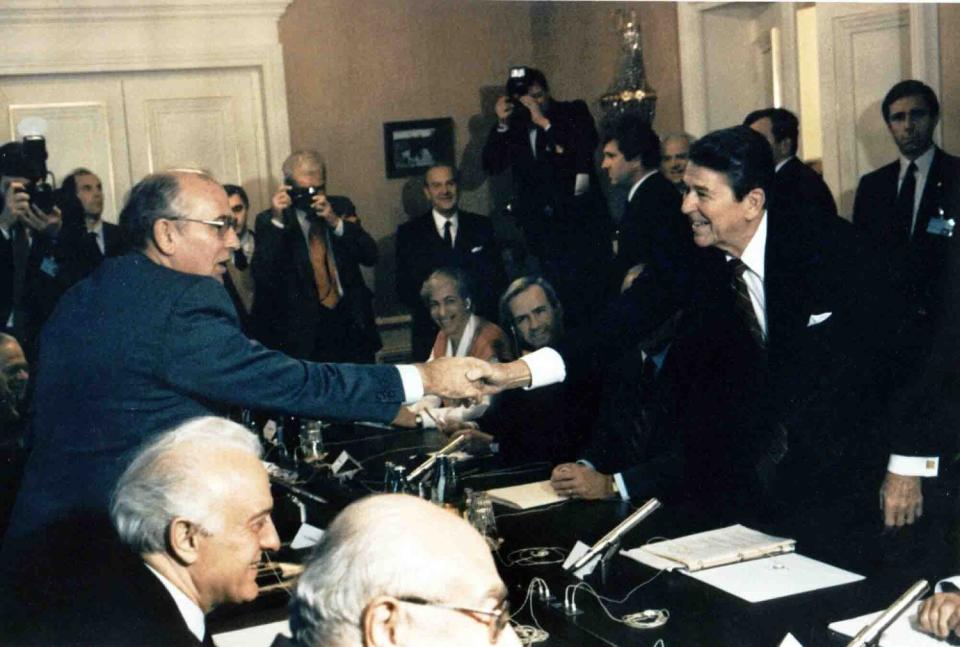
As warmly as Gorbachev’s reforms were received in the West, they slowly superseded him at home, setting in motion a progressive weakening of the once-omnipotent Communist Party, which led to its downfall and the breakup of the Soviet Union. Decades later, Putin, who viewed the collapse of the Soviet Union the “greatest geopolitical catastrophe of the century,” would try to reclaim some of the lost territory with the forced annexation of Crimea and the invasion of Ukraine.
Change cost Gorbachev any significant political future in his homeland. With the crushing defeat of the social experiment that had begun with the 1917 Bolshevik Revolution, the man who dared to concede that central planning had been a failure found himself swept out of the Kremlin in 1991, first by a short-lived August coup d’etat by hard-liners and for good at the end of the year when the Soviet Union formally disbanded.
Gorbachev never lost the esteem of Western leaders and champions of democracy, but in his own country he became the scapegoat for all the transitional hardships and suffering of a troubled nation searching for a new identity.
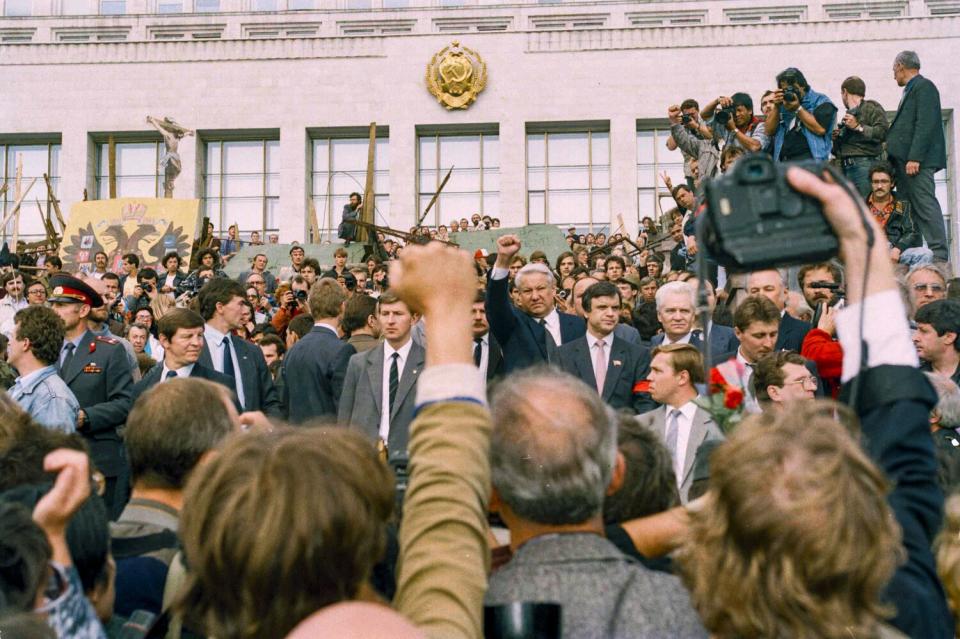
Named Time magazine’s Man of the Decade for the 1980s and the revered object of “Gorbymania” throughout Europe, the fallen leader’s rejection by his own people was brutally reiterated in 1996, when he ran for president and won barely 1% of the national vote in a contest won by his successor and nemesis, Boris N. Yeltsin.
He spent the last decades of his life traveling and speaking on international affairs and the hazards of pollution and the global arms industry. He wrote columns for foreign publications, founded a Moscow think tank bearing his name and raised money with speaking tours to finance the institute and the Green Cross environmental initiative he launched in Geneva.
He slowed his hectic pace after the devastating death of his beloved wife, Raisa, of leukemia in 1999. His forays into the political limelight also dwindled to funerals and symbolic reunions, including the Washington rites for former President Reagan in 2004 and the Nov. 9, 2009, gathering in the German capital to mark the 20th anniversary of the Berlin Wall’s fall. He was a frequent critic of President Trump, whose initiatives he dismissed as "not the work of a great mind," and urged President Biden to help normalize relations with Russia.
Mikhail Sergeyevich Gorbachev was born to a peasant family on March 2, 1931, amid one of dictator Josef Stalin’s most savage endeavors, the forced collectivization of agriculture that left millions of rural Russians to starve. Gorbachev’s earliest memories during his childhood in the village of Privolnoye in the Stavropol region of southern Russia’s Farm Belt were of hunger and confusion.
When Privolnoye’s men were called to the World War II front to defend their country against the Nazi invasion, Gorbachev inherited responsibility for farm and household at age 10. His strong organizational skills earned him notice in the postwar community and won him a coveted scholarship from the local Communist Party to attend Moscow State University. He packed his one presentable suit for the train journey north and began studying law in 1950.
Gorbachev’s work at the university brought him into the acquaintance of Raisa Maximovna Titorenko, a philosophy student. They married in 1953.
After graduation in 1955, Gorbachev returned home to the Stavropol region, where he took a job at the regional office of Komsomol, the Communist youth organization. The Gorbachevs’ only child, Irina, was born there in 1957.
Gorbachev rose quickly through the Komsomol ranks, then drew appointments from the Moscow party hierarchy to regional leadership posts and the 1,500-member Supreme Soviet legislative body.
His star rose further thanks to an early acquaintance with Politburo member Yuri V. Andropov, the KGB director and future Soviet leader who spent his vacations in the Stavropol region. In the steam baths of local sanatoriums, Andropov and Gorbachev shared their fear that if reforms were not executed in the Soviet Union the economy was destined for disaster.
Having completed a second degree in “scientific agricultural economics” in 1967, Gorbachev was named agriculture secretary in 1978. But it was one task at which he was seen as having failed, because farm output continued to tumble during his tenure.
Still, Gorbachev remained a confidant of Andropov and rose in influence when Andropov became Soviet leader after the death of Leonid I. Brezhnev in 1982.
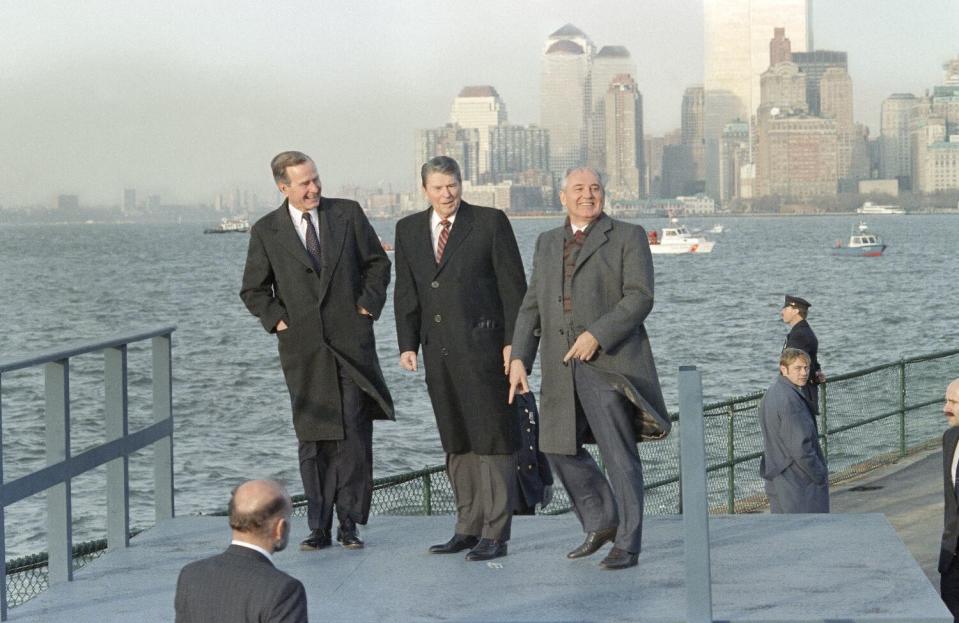
When Andropov died in 1984, the Kremlin old guard prevailed in getting Konstantin U. Chernenko named as the new leader. The aging and frail Chernenko had little impact during the remaining 13 months of his life.
Gorbachev used Chernenko’s brief tenure to gather power inside the Kremlin. He also introduced himself to the West, visiting then-British Prime Minister Margaret Thatcher in London in 1984. Thatcher’s comment, “I like Mr. Gorbachev. We can do business together,” marked the beginning of the West’s recognition of Gorbachev as a categorically different brand of Kremlin leader.
When he was elected general secretary after Chernenko’s death March 10, 1985, international observers as well as fellow Soviets sensed that dramatic change was about to begin.
After years of aged, decrepit leaders, Gorbachev made a deep impression on his own people and the international community as he talked about glasnost, the openness he believed vital to spotlighting and correcting problems, and perestroika, his vision of a thorough restructuring of politics, economics and society as a whole.
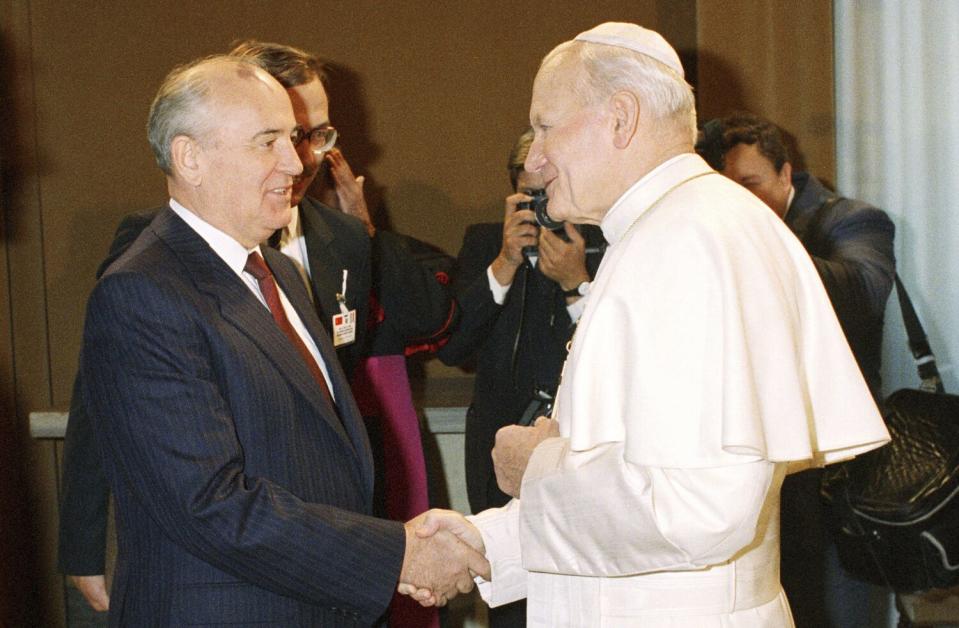
Television was one of Gorbachev’s most cleverly wielded tools. Camera crews followed him as he waded into cheering crowds to hear what was on the minds of the people and to beam his long-winded formulas for correction to the masses.
In tackling the mammoth job of reviving the moribund Soviet economy, Gorbachev enlisted other young, reform-minded officials. One was Yeltsin, who was brought in to run the city of Moscow and then head the Construction Ministry. Another was Alexander Yakovlev, the former Soviet ambassador to Canada who was the ideological godfather of perestroika.
One early miscalculation Gorbachev made was trying to separate his subjects from their vodka bottles, even if his goal was as noble as improving his countrymen’s health. His 1985 anti-drinking drive cut alcohol production and sales hours and imposed stiff fines on those found drunk in public. But the population was outraged, and desperate attempts by hard-core drinkers to sate their addiction led to tens of thousands of poisonings from drinking cologne and cleaning solutions.
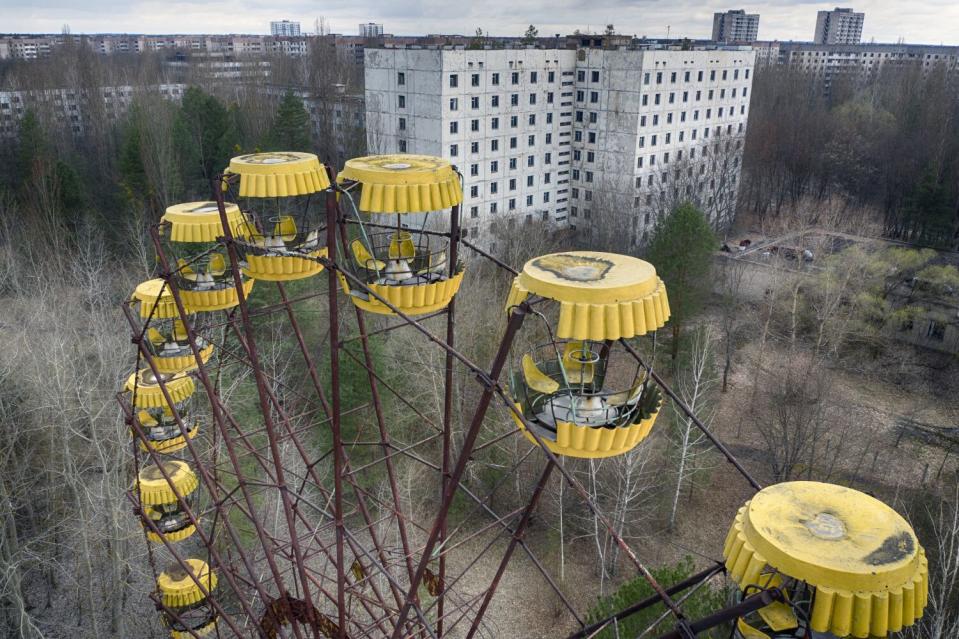
Another early setback for the youngest and last man to lead the Soviet Union was the April 1986 catastrophe at the Chernobyl nuclear power plant in Ukraine — then a Soviet republic — which killed dozens in the immediate aftermath and severely contaminated northern Ukraine and southern Belarus.
But Chernobyl also marked the real advent of truth and openness in the Soviet media, a concept that during the first year of Gorbachev’s rule was little more than a slogan. Media exposes on the complacency of Chernobyl plant workers accompanied harrowing tales of the plight of the unsuspecting firefighters sent in to contain the radioactive hemorrhage.
And as the nation came to grips with the numbing truth of how shabby technology had brought on the disaster, the media slowly turned to other bitter legacies of the past. The crimes of Stalin were exposed in the most trusted magazines and newspapers, prompting the introspection that Gorbachev had all along deemed necessary to spur reform.
Still, perestroika evolved slowly as Gorbachev’s new team pondered how to reinvent the lost notions of competition, initiative, personal responsibility and innovation. As Gorbachev’s ideas drifted further from the tenets of communism, he surprised and frightened many in the government, foremost among them his deputy, Yegor K. Ligachev.
Ligachev controlled the vast Communist Party apparatus, and it took Gorbachev several years of cunning maneuvering to wrest control from conservative party figures who opposed reform.
Though progress in meeting consumer demands was slow, Gorbachev achieved more rapid success in opening cultural life. Long-banished literary works such as Boris Pasternak’s “Doctor Zhivago,” Alexander I. Solzhenitsyn’s “The Gulag Archipelago” and George Orwell’s totalitarian allegory, “Animal Farm,” were published for the first time in the Soviet Union.
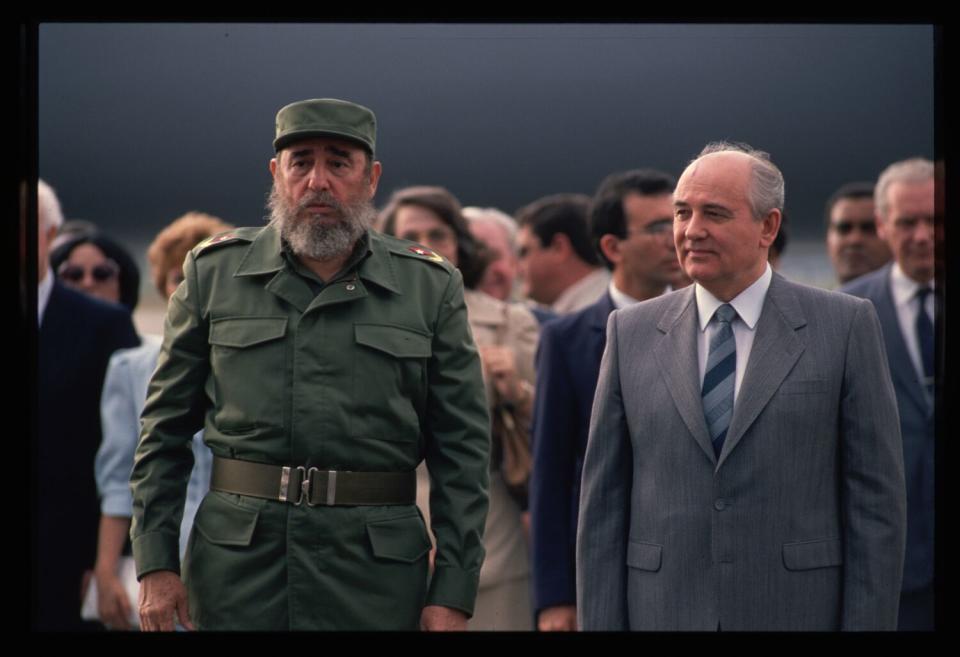
The government also ceased jamming foreign radio broadcasts and lifted the ideological restraints that had corrupted art throughout the Soviet era.
Hundreds of thousands of Jews and Germans were allowed to emigrate, and political prisoners such as Nobel Peace Prize laureate Andrei D. Sakharov were released from prison and exile.
In 1988, the Kremlin acknowledged defeat and ignominy in its decade-long battle to control Afghanistan and began a yearlong withdrawal. More than 13,000 Soviet troops died in the conflict.
Ironically, the moves to liberate Soviet citizens from the tyrannies of the past made Gorbachev more popular in the West than in his own country. Many Soviets began taking advantage of the freer atmosphere to grouse that Gorbachev was nothing more than a baltun — a blowhard.
Gorbachev’s contributions to the collapse of communism were better appreciated abroad. He signaled to the subjugated states of Eastern Europe that they, too, had the right to decide their own affairs. From Poland to Romania, the imposed fraternity of socialist states crumbled and independent leaders rose to power in free and fair elections.
The charismatic Soviet leader also changed his country’s relations with the capitalist world, penning watershed disarmament deals with the countries of the North Atlantic Treaty Organization and seeking stronger trade ties with Western Europe.
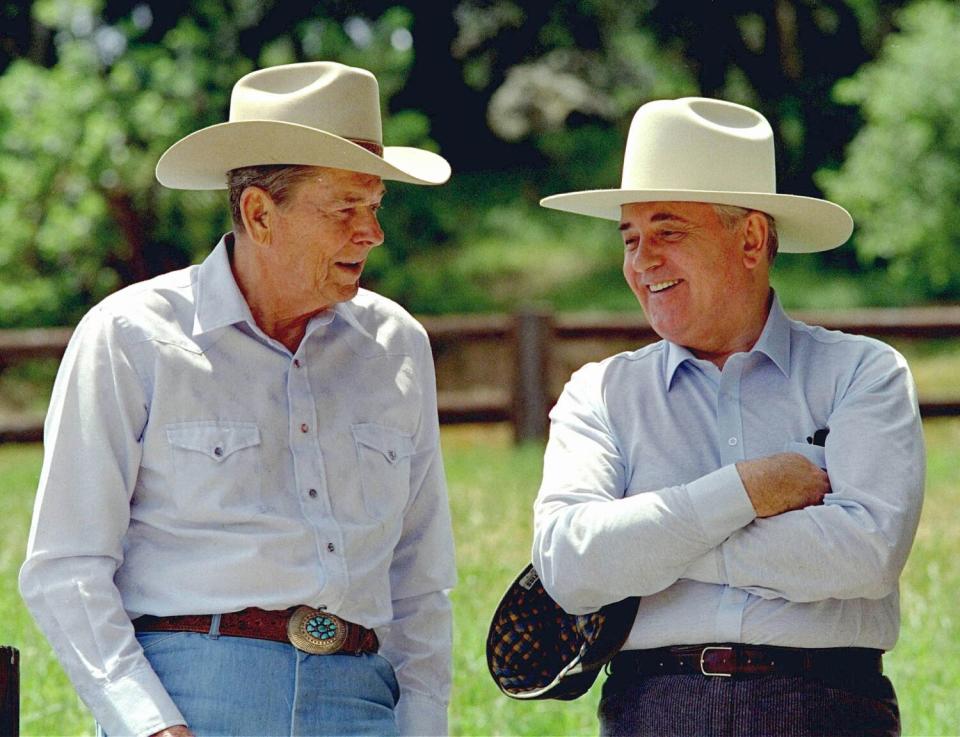
Gorbachev’s relations with President Reagan took longer to warm, although the two proclaimed their first summit, in Geneva in 1985, a success in breaking the ice between the adversarial nations. Their 1986 summit in Iceland ended without the arms control breakthrough that many negotiators had expected, but it produced a change in atmosphere that allowed the leaders to agree on major weapons cutbacks during subsequent meetings.
The Soviet leader’s first serious strike at the omnipotence of the Communist Party came in the summer of 1988, when he closed the 19th Communist Party Conference, a massive gathering of the faithful, with a proposal to elect a new parliament of deputies chosen in competitive elections.
As the rigid political system that had held the Soviet Union together started to relax, so did it weaken. Soviet republics that had been added to the Communist empire by force began agitating for independence.
The first to bolt was Lithuania, which declared independence in 1990. Gorbachev at first sent in troops and tanks, but soon changed tactics, trying to bring the republics into a new agreement giving them some sovereignty while maintaining the illusion of a unified federation.
His restraint in that first faceoff with a defecting republic was believed to have been decisive in his receiving the 1990 Nobel Peace Prize.
But Yeltsin’s election as leader of the powerful and increasingly rebellious Russian republic didn’t make matters any easier. Yeltsin pushed Gorbachev to cede more power to the republics, leading to a revised power-sharing agreement, the Union Treaty, which redefined the relationship between the center and regions. It was set for signing on Aug. 20, 1991.
On the morning before the signing ceremony, tanks rolled into Moscow on the orders of a dozen hard-line Communist putschists who had Gorbachev seized and placed under house arrest.
But the coup plotters made two fatal miscalculations. Their first was to believe that the people were opposed to reform. The second was failing to arrest Yeltsin, who seized the moment to assure the stunned masses that they would never again fall victim to “red bandits.”
Yeltsin rallied tens of thousands to the White House, the headquarters of the Russian government on the Moscow River, scrambling atop tanks to address the crowd. The coup drew criticism from governments throughout the world. After three tense days, the coup leaders surrendered.
Gorbachev returned to Moscow looking haggard and defeated. Raisa Gorbachev had suffered a mild stroke during the ordeal that for years affected her speech.
The coup helped Gorbachev and others recognize that power had shifted to the republics and that the Soviet Union had no further reason to exist.
When the Soviet flag was lowered at the Kremlin at the end of 1991 and the Russian flag went up, the man who had freed a continent from totalitarianism quietly accepted his fate as a politician who had served his purpose.
Williams is a former Times staff writer. Staff writer Steve Marble contributed to this report.
This story originally appeared in Los Angeles Times.

